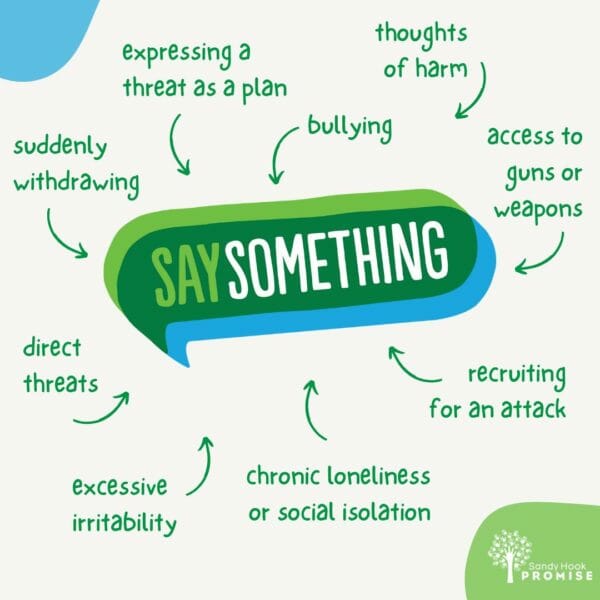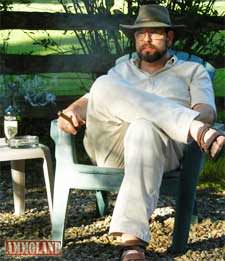
U.S.A. – -(Ammoland.com)- “We all have a responsibility to do something about gun violence,” opinion contributor Mark Barden writes in The Hill. “By speaking up to get help when seeing the potential for violence, we can save lives.”
“Speaking up” how?
“Students nationwide are leading the way,” Barden asserts. “[T]hey will be participating in Say Something Week, celebrating those in the community who are upstanders, who say something when they see warning signs. While lawmakers have failed to address gun violence, these student upstanders are helping their peers feel more connected to one another and their community.”
Barden, founder and CEO of Sandy Hook Promise, has an especially powerful voice in terms of emotional impact. His young son was one of the victims. It’s powerful not only because of the media platform he now has but also because all good people were sickened by the terror and agony the murdered children were forced to endure. We who are parents, and who treasure our children above our own lives, share heartfelt sympathy as we try to fathom the crippling anguish that he must be reliving in every waking moment, and in nightmares that we can only pray we never dream.
Our natural inclination is to want to offer comfort to someone in such pain, and decent people, who can only imagine his loss, loathe fighting back against him even as he’s bringing a fight to us. If we value our rights, though, we have to fight not against the man, but certainly against the citizen disarmament ideology that he represents.
We’re sorry for his loss, but it’s not our fault. It does not give him a claim on our rights, and it does not make the ideas he promulgates above reproach. He doesn’t want our sympathy, he wants our disarmament. And we won’t forget that the murdering monster who was the catalyst, in this case, was enabled by “gun-free” mandates that ensured he would have a defenseless victim pool where no one would be equipped to stop him. That is, until men with guns showed up, at which point the evil freak ended himself.
The “Say Something” campaign Barden is pushing won’t change that. What the slick PR professionals call “student upstanders” is basically another way of saying “informants,” and while there can be times when doing that can be lifesaving and needed, like all tools, it can be used for great good or great evil.
Kind of like guns?
To that end, Sandy Hook Promise has established a reporting system for budding “upstanders,” complete with a phone app and assurances of anonymity. They also include a professionally produced video (with no ability to dislike or comment) to “educate” on “warning signs”:
Forgotten by most is an allegation from Albert Gonzalez Films, where he posted a side-by-side comparison of his original short film from 2011 with Sandy Hook Promise’s “PSA”:
But back to the “Say Something” program. Look at the list of what they want to be reported—there’s plenty of room for subjective interpretation, in terms of what constitutes a “threat,” in term of what constitutes “bragging about weapons,” in terms of what “any other troubling situation or behavior” means, and who is troubled by it… After all, we’ve seen ludicrous and dangerous overreactions like students reported to police over Nerf guns in Zoom calls.
Sandy Hook Promise has a well-funded 24/7 “Crisis Center” to “manage the tips,” meaning if they buy what they’re being told, it won’t stop there. Then there’s the “tip form” that promises “It’s easy and completely confidential to report safety concerns to help prevent violence and tragedies.”
Is it?
Read the fine print:
“NOTE: If you provide your name and/or contact information, you acknowledge that it will be provided to assist in resolving the concern or threat you are reporting. If you deliberately provide false information or use this system to threaten or harass someone, you may be subject to criminal prosecution.”
Great. But if you didn’t provide your name, how would they know? And importantly, if someone used the “Say Something” program to victimize you, how would you know who they are to seek justice (provided you can)?
The comparisons between this and ATF’s “anonymous” tip system show as many similarities as the Sandy Hook Promise PSA and the Gonzales film, and raise the same questions about the potential for abuse, up to and including “swatting,” and relying on anonymity guarantees to get revenge.
“Say something does not [unintelligible] because when you snitch, it’s purposely intending badness upon a person, you want to do this to get them in trouble,” one empathy-exuding Illinois student insists. “But when you say something, you’re doing it to protect everyone including yourself.”
Snitching may not be her intent, but people, especially “progressives” intentionally calling in false tips to score political points is well documented, like what TikTokers did in response to the new abortion law in Texas. Yes, of course, there is a time and place for young people to be responsible citizens and stand up for what’s right, and to help when needed.
The answer is not a compulsory education system that creates a culture of alarmist teenage CIs (confidential informants). That’s especially true among young people indoctrinated into hating and fearing firearms by the predominantly leftist hoplophobes “teaching” them. If the object is to stop school shootings, the only thing that will is the one thing the people pushing “tip lines” reject via evil-enabling Second Amendment-free zones.
About David Codrea:
David Codrea is the winner of multiple journalist awards for investigating/defending the RKBA and a long-time gun owner rights advocate who defiantly challenges the folly of citizen disarmament. He blogs at “The War on Guns: Notes from the Resistance,” is a regularly featured contributor to Firearms News, and posts on Twitter: @dcodrea and Facebook.

